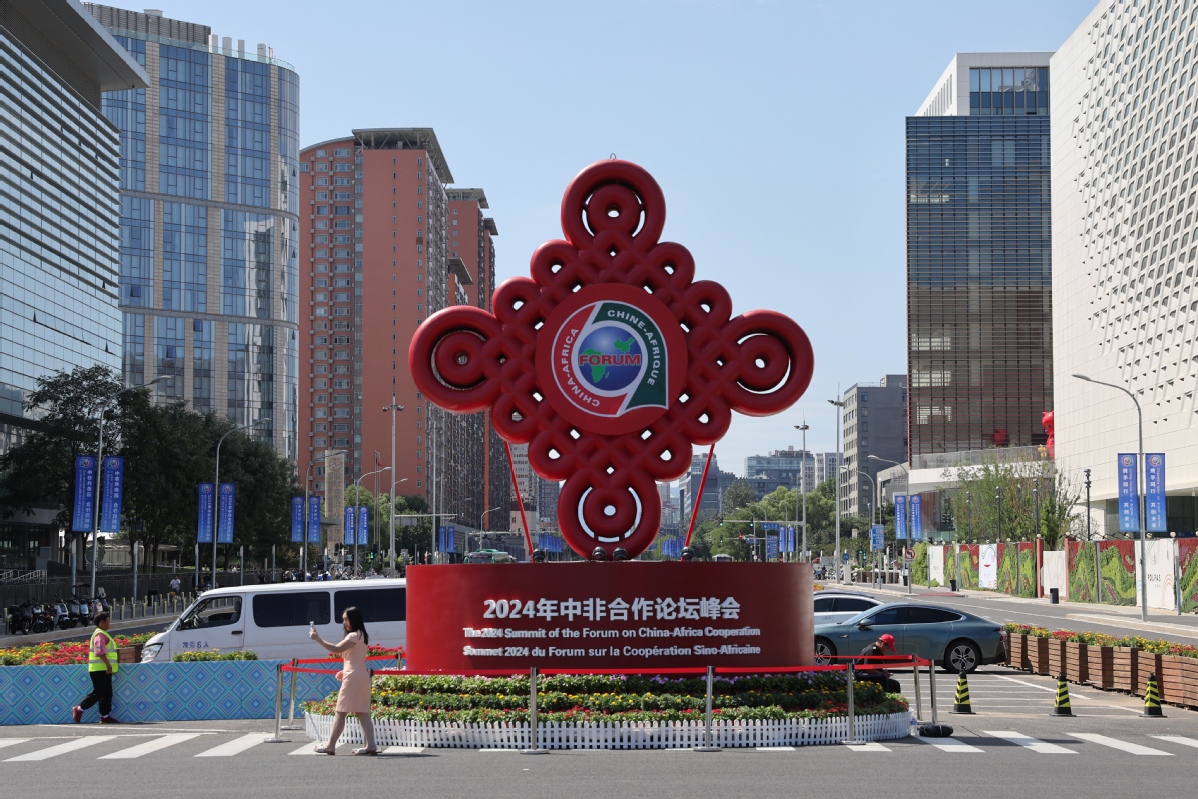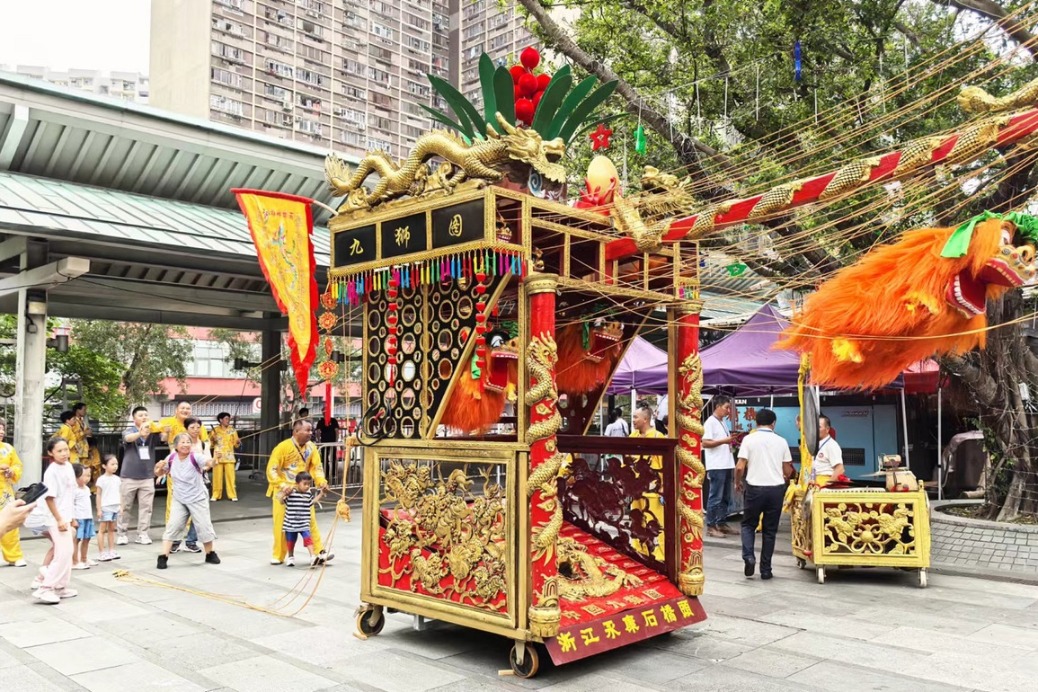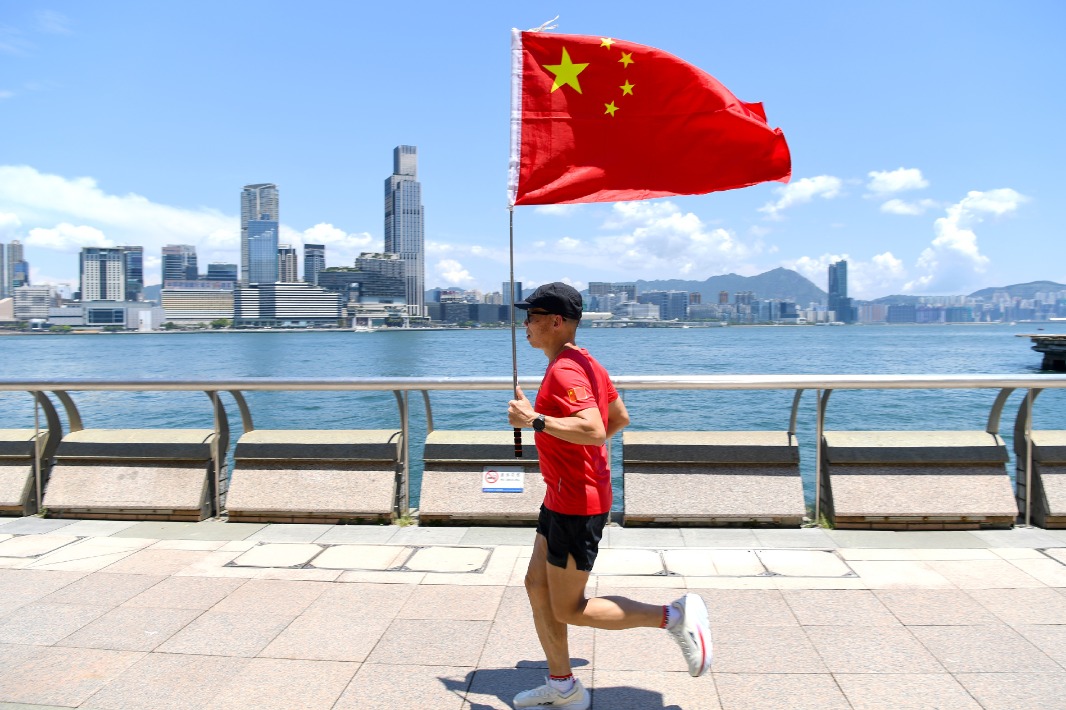China strives for global stability, prosperity
Country committed to fostering shared future for mankind. Cao Desheng reports.


The 75-year journey of the People's Republic of China has witnessed the relentless efforts of the Chinese people to pursue development and progress, creating a miracle of long-term economic growth and social stability.
As it embarks on the journey of Chinese modernization in the new era, the country strives to realize its dream of national rejuvenation through modernization and peaceful development. With a vision for human progress, it remains committed to providing new opportunities for world peace and development through its own prosperity.
At the 2024 Summit of the Forum on China-Africa Cooperation in Beijing in September, President Xi Jinping called on China and African countries — encompassing 2.8 billion people and almost one-third of the world's population — to join hands in advancing modernization.
He said, "China and Africa's joint pursuit of modernization will set off a wave of modernization in the Global South, and open a new chapter in our drive for a community with a shared future for mankind."
Promoter of peace
Holding high the banner of peace, development and win-win cooperation, New China, under the leadership of the Communist Party of China, pursues the path of peaceful development, fosters friendship and cooperation with all countries, and promotes common development across the world.
The Tian'anmen Rostrum at the center of Beijing, the symbol of the PRC, is adorned with the monumental inscription "Long Live the Great Unity of the Peoples of the World", a profound message reflecting the nation's global vision for international peace and harmony.
The inscription, remaining there since 1950, the year following the founding of New China, remains highly relevant in a world which is riven with divisions, conflicts and wars.
Carrying forward the spirit of this iconic inscription, Xi's vision of building a community with a shared future for mankind offers a beacon of hope for peaceful coexistence and shared development amid global disorder and conflicts.
Yasir Habib Khan, president of the Institute of International Relations & Media Research in Pakistan, said that China's peaceful diplomacy is taking center stage in the international arena as Beijing has made strenuous efforts to restore peace and stability in Asia, the Middle East, Europe and other parts of the world.
When the Cold War was at its peak in the 1950s, Chinese wisdom, rooted in centuries of a peaceful civilization, came up with the Five Principles of Peaceful Coexistence, namely mutual respect for sovereignty and territorial integrity, mutual nonaggression, noninterference in each other's internal affairs, equality and mutual benefit, and peaceful coexistence, Khan said.
"Today the Chinese leadership has reinvigorated these values at a defining moment when a new Cold War is rearing its ugly head," he said.
"The vision of building a community with a shared future for mankind is the most effective move to sustain, promote and upgrade the Five Principles of Peaceful Coexistence in the new circumstances."
Owing to its universal appeal, the Five Principles of Peaceful Coexistence, which has been the bedrock of China's independent foreign policy of peace and incorporated into the nation's Constitution, offers global insight into how developed and developing countries can live together.
Among the world's major countries, China has the best track record with respect to peace and security.
With a Chinese approach to resolving hot spot issues, the path of impartiality and peaceful diplomacy, which is consistently pursued by China, stands out in today's world as Beijing takes an active role in mediating conflicts and promoting dialogue to achieve peace.
It has been playing a constructive role in the Ukraine crisis, the Palestine-Israel conflict, and issues relating to the Korean Peninsula, Iran, Myanmar and Afghanistan.
With regard to the Palestinian question, the Beijing Declaration signed by 14 Palestinian factions in Beijing on July 23 to end division and strengthen unity has made China a focal point of global diplomacy.
The signing of the declaration was a crucial step toward resolving the Palestinian question and achieving peace and stability in the Middle East. It was also the first time that an internal Palestinian reconciliation document has been agreed with the decisive help of a country outside the Arab world.
In another development, after years of open hostility, Saudi Arabia and Iran agreed on March 10 to restore diplomatic ties after talks facilitated by China, a significant development for the two nations and a boon to the security and stability of the Middle East.
Analysts praised China for its role as a peace broker and its efforts to facilitate dialogue. This also showed that China's diplomatic philosophy that aims to promote peace and development is much more appealing than some other countries' tactics of fueling confrontation to expand their own interests in the Gulf region, they said.
"China's impartial stance, free from selfish motives or interests, has garnered increasing trust from the international community," Khan said.
In April 2022, Xi proposed the Global Security Initiative, which advocates a vision of common, comprehensive, cooperative and sustainable security, follows the philosophy that humanity is an indivisible security community, and aims to create a new path to security that features dialogue over confrontation, partnership over alliance and win-win over zero-sum.
Currently, China is a major troop contributor and the second-largest financial contributor to United Nations peacekeeping operations.
In the Report to the 20th CPC National Congress in October 2022, Xi said that in pursuing modernization, China will not tread the old path of war, colonization and plunder, which has been taken by some countries.
"Dedicated to peace, development, cooperation and mutual benefit, we will strive to safeguard world peace and development as we pursue our own development, and we will make greater contributions to world peace and development through our own development," he said.
Contributor to growth
In promoting the building of a community with a shared future for mankind, China matches its words with deeds.
Since China embarked on reform and opening-up in 1978, it has made tremendous contributions to world peace and development through its own growth. The nation's contribution to global economic growth averaged 24.8 percent from 1979 to 2023, ranking top in the world, according to the National Bureau of Statistics.
China has become the world's largest manufacturer, the largest country in terms of trade in goods, and the largest holder of foreign exchange reserves. The Chinese economy's stable and sound development adds a welcome element of certainty to an uncertain global economic environment.
David Morris, founder and president of 1Earth Village, a consultancy platform, said that each generation deals with big changes, but the world is currently experiencing a storm of seismic disruptions in the balance of power, a technological transformation and a climate crisis.
"China is central to each of these, and how China manages its own internal challenges will affect not only the people of China, but also the rest of the world," Morris said.
The burgeoning Belt and Road Initiative, which was launched in 2013 to promote the building of a community with a shared future for mankind, has shown how China translates its words into deeds and how the concept helps change the world.
A series of landmark Belt and Road projects have come to fruition. Among them, the China-Europe Railway Express comprises a network of rail lines spanning Europe and Asia, with 86 operational routes running to over 200 cities in 25 European countries.
The China-Laos Railway helps the Lao people realize their dream of turning their landlocked nation into a land-linked one, opening up a new route to development and prosperity.
The Port of Piraeus in Greece, which increased its annual cargo throughput to more than 5 million TEUs, has become Europe's fourth-largest container port and a leading one in the Mediterranean Sea.
From 2013 to 2023, the BRI has galvanized nearly $1 trillion of investment, established more than 3,000 cooperation projects, created 420,000 local jobs, and helped lift almost 40 million people out of poverty, according to the Foreign Ministry.
The Belt and Road projects have demonstrated how effective cooperation can transform the concept of building a community with a shared future for mankind into a practical reality, Almas Chukin, a prominent Kazakh economist, was quoted by Xinhua News Agency as saying.
Bearing in mind that no person or country can thrive in isolation, China has been championing an open economy and promoting more balanced, inclusive and sustainable growth, thus enabling the world to share in its development opportunities.
The establishment of free trade zones marks a milestone in China's opening-up. Since the inauguration of China's first pilot free trade zone in Shanghai in 2013, the number has expanded to 22.
Through institutional innovations such as decoupling business licenses from operation permits, mutual recognition of qualifications, and one-stop service counters, these zones have made significant strides in simplifying administrative procedures, improving the business environment, enhancing customs efficiency, and invigorating enterprise activities.
The China International Import Expo, as the world's first import-themed exhibition, represents another major breakthrough in China's path of opening-up, marking a significant innovation in global economic openness.
Since its inaugural event in Shanghai in 2018, the CIIE has successfully hosted six editions. The sixth CIIE in November 2023 attracted 3,486 companies from 128 countries and regions, with the value of intended deals exceeding $78.4 billion. Compared with previous expos, the CIIE not only highlights advanced technologies and products, but also provides a rare opportunity for less developed countries to access international markets.
The Resolution of the Central Committee of the Communist Party of China on Further Deepening Reform Comprehensively to Advance Chinese Modernization, adopted at the third plenary session of the 20th CPC Central Committee in July, has made it clear that "opening-up is a defining feature of Chinese modernization".
"We must remain committed to the basic State policy of opening to the outside world and continue to promote reform through opening-up. Leveraging the strengths of China's enormous market, we will enhance our capacity for opening-up while expanding international cooperation and develop new institutions for a higher-standard open economy," the resolution said.
Analysts said that China's journey from a planned economy to a market economy through market-oriented reforms has been of immense significance not only for China itself but also offers valuable experiences for other countries.
The Chinese path toward modernization is not just about developing itself but also about benefiting the world at large, said Yu Yunquan, a senior research fellow at the Academy of Contemporary China and World Studies.
"The goal of the Chinese path to modernization is not monolithic, but multifaceted, including China's peaceful development, creating opportunities for the world, common prosperity and win-win cooperation," Yu said.
Upholder of intl order
With the world beset with such grave challenges as a sluggish economic recovery, surging isolationism and protectionism, rising hegemonism and flare-ups of geopolitical conflicts, the international community is exploring the way forward.
Against such a backdrop, China has offered a series of major initiatives to promote greater democracy in international relations and works to make global governance fairer and more equitable.
In a keynote speech at the "China in the World" session at the 60th Munich Security Conference in February, Foreign Minister Wang Yi reassured the world that China will be a force for stability in enhancing global governance.
China supports the authority of the United Nations and its core status, as well as the UN Security Council's primary role in peace and security issues, he said, adding that it has been strengthening solidarity and cooperation in the Global South and striving to enhance the representation and voice of developing countries in global affairs.
As the world faces the threat of climate change, China has pushed for the UN Climate Change Conference (COP 28) held in Dubai, the United Arab Emirates, in December to achieve the UAE consensus.
In response to the challenge of artificial intelligence, China released the Global Artificial Intelligence Governance Initiative last year, and supports the establishment of an international governance body for artificial intelligence within the framework of the UN to jointly safeguard human well-being.
From the BRI to the Global Development Initiative, the Global Security Initiative and the Global Civilization Initiative, the country has provided an array of public goods to address global challenges.
Wolfram Adolphi, a political scientist and Sinologist at the Rosa Luxemburg Foundation in Germany, said it is of strategic significance for the whole world that China pursues the GDI, the GSI and the GCI, and participates in efforts to lead the reform and development of the global governance system.
"The first quarter of the 21st century clearly bears witness to the fact that these Chinese efforts are finding growing support by a majority of countries around the world. They all see that the respective Chinese initiatives are not empty words but based on a growing complex of political practice, such as the BRI, BRICS, the Shanghai Cooperation Organization, and also the ongoing efforts to find a way for peace in the wars in Ukraine and the Middle East," Adolphi said.
Drawing a blueprint for a more inclusive development of the world, the GDI has won international recognition. More than 100 countries and a number of international organizations, including the United Nations, have committed support to the GDI, and over 80 countries have joined the Group of Friends of the GDI, according to Foreign Ministry.
Contact the writer at caodesheng@chinadaily.com.cn
- Renmin University's new Tongzhou campus officially opens
- China's top political advisor urges renewed efforts in building community for Chinese nation
- Taiwan issues typhoon warning as Krathon nears
- Most Chinese regions to enjoy sunny weather during National Day holiday
- Remains of 8 martyrs identified in Xizang
- Martyrs' Messenger: Are you still waiting for me?





































